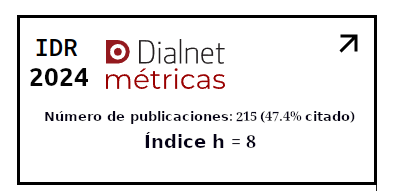Evidencias preliminares de validez y confiabilidad de una escala breve de autocompasión en adolescentes peruanos
Palabras clave:
autocompasión, análisis factorial confirmatorio, adolescentes, validez, fiabilidadResumen
El presente estudio tuvo como objetivo analizar la estructura interna y determinar el grado de fiabilidad del Self-Compassion Scale–Short Form (SCS-SF) en adolescentes peruanos. Para ello se contó con una muestra de 365 adolescentes de un rango de edad de 12 a 18 años (M = 15.22; DE = 1.29). Los resultados del análisis factorial confirmatorio evidencian adecuados índices de ajuste en el modelo de dos factores con correlaciones en los ítems 5,10,11 y 12 (CFI = .92, TLI = .90, RMSEA = 0.062, SRMR = .060). Asimismo, los valores de fiabilidad fueron aceptables para la dimensión autocompasión (α=.71; H=.75) y autocriticismo (α=81; H=.83). Se concluye que la SCS-SF es un instrumento breve y útil que presenta adecuadas evidencias psicométricas para medir el grado de comprensión y calidez de las personas consigo mismas cuando experimentan situaciones de sufrimiento y fracaso.
Descargas
Referencias
Aiken, L. R. (1980). Content validity and reliability of single items or questionnaires. Educational and Psychological Measurement, 40(4), 955–959. https://doi.org/10.1177/001316448004000419
Babenko, O., y Guo, Q. (2019). Measuring self-compassion in medical students: factorial validation of the Self-Compassion Scale–Short Form (SCS-SF). Academic Psychiatry, 43(6), 590–594. https://doi.org/10.1007/s40596-019-01095-x
Baer, R. A., Lykins, E. L. B., y Peters, J. R. (2012). Mindfulness and self-compassion as predictors of psychological wellbeing in long-term meditators and matched nonmeditators. Journal of Positive Psychology, 7(3), 230–238. https://doi.org/10.1080/17439760.2012.674548
Barry, C. T., Loflin, D. C., y Doucette, H. (2015). Adolescent self-compassion: Associations with narcissism, self-esteem, aggression, and internalizing symptoms in at-risk males. Personality and Individual Differences, 77, 118–123. https://doi.org/10.1016/j.paid.2014.12.036
Bluth, K., y Blanton, P. W. (2014). Mindfulness and Self-Compassion: Exploring pathways to adolescent emotional well-being. Journal of Child and Family Studies, 23(7), 1298–1309. https://doi.org/10.1007/s10826-013-9830-2
Bluth, K., y Blanton, P. W. (2015). The influence of self-compassion on emotional well-being among early and older adolescent males and females. Journal of Positive Psychology, 10(3), 219–230. https://doi.org/10.1080/17439760.2014.936967
Brown, T. A. (2015). Confirmatory factor analysis for applied research (Second Edit).
Castilho, P., Pinto-Gouveia, J., y Duarte, J. (2015). Evaluating the multifactor structure of the long and short versions of the self-compassion scale in a clinical sample. Journal of Clinical Psychology, 71(9), 856–870. https://doi.org/10.1002/jclp.22187
Chen, G., He, J., Cai, Z., y Fan, X. (2020). Perceived parenting styles and body appreciation among chinese adolescents: Exploring the mediating roles of dispositional mindfulness and self-compassion. Children and Youth Services Review, 119, 105698. https://doi.org/10.1016/j.childyouth.2020.105698
Cho, E. (2016). Making reliability reliable. Organizational Research Methods, 19(4), 651–682. https://doi.org/10.1177/1094428116656239
De Souza, L., y Hutz, C. (2016). Adaptation of the self-compassion scale for use in Brazil: Evidences of construct validity. Temas Em Psicologia, 24(1), 159–172. https://doi.org/10.9788/TP2016.1-11
Dominguez-Lara, S. A. (2016). Evaluación de la confiabilidad del constructo mediante el coeficiente H: Breve revisión conceptual y aplicaciones. Psychologia, 10(2), 87–94. https://doi.org/10.21500/19002386.2134
Ferrando, P. J., y Anguiano-Carrasco, C. (2010). El análisis factorial como técnica de investigación en psicología. Papeles del Psicólogo, 31(1), 18–33. Recuperado de http://www.papelesdelpsicologo.es/pdf/1793.pdf
Forero, C. G., Maydeu-Olivares, A., y Gallardo-Pujol, D. (2009). Factor analysis with ordinal indicators: A Monte Carlo Study Comparing DWLS and ULS Estimation. Structural Equation Modeling: A Multidisciplinary Journal, 16(4), 625–641. https://doi.org/10.1080/10705510903203573
Galla, B. M. (2016). Within-person changes in mindfulness and self-compassion predict enhanced emotional well-being in healthy, but stressed adolescents. Journal of Adolescence, 49, 204–217. https://doi.org/10.1016/j.adolescence.2016.03.016
Garcia-Campayo, J., Navarro-Gil, M., Andrés, E., Montero-Marin, J., López-Artal, L., y Demarzo, M. M. (2014). Validation of the Spanish versions of the long (26 items) and short (12 items) forms of the Self-Compassion Scale (SCS). Health and Quality of Life Outcomes, 12(1), 4. https://doi.org/10.1186/1477-7525-12-4
Gill, C., Watson, L., Williams, C., y Chan, S. W. Y. (2018). Social anxiety and self-compassion in adolescents. Journal of Adolescence, 69, 163–174. https://doi.org/10.1016/j.adolescence.2018.10.004
Hayes, J. A., Lockard, A. J., Janis, R. A., y Locke, B. D. (2016). Construct validity of the Self-Compassion Scale-Short Form among psychotherapy clients. Counselling Psychology Quarterly, 29(4), 405–422. https://doi.org/10.1080/09515070.2016.1138397
Hu, L. T., y Bentler, P. M. (1999). Cutoff criteria for fit indexes in covariance structure analysis: Conventional criteria versus new alternatives. Structural Equation Modeling, 6(1), 1–55. https://doi.org/10.1080/10705519909540118
Kemper, K. J., Mo, X., y Khayat, R. (2015). Are mindfulness and self-compassion associated with sleep and resilience in health professionals? Journal of Alternative and Complementary Medicine, 21(8), 496–503. https://doi.org/10.1089/acm.2014.0281
Kotera, Y., y Sheffield, D. (2020). Revisiting the Self-compassion Scale-Short Form: Stronger Associations with Self-inadequacy and Resilience. SN Comprehensive Clinical Medicine, 2(6), 761–769. https://doi.org/10.1007/s42399-020-00309-w
López, A., Sanderman, R., Smink, A., Zhang, Y., van Sonderen, E., Ranchor, A., y Schroevers, M. J. (2015). A reconsideration of the Self-Compassion Scale’s Total Score: Self-Compassion versus Self-Criticism. PLOS ONE, 10(7), e0132940. https://doi.org/10.1371/journal.pone.0132940
Mehr, K. E., y Adams, A. C. (2016). Self-Compassion as a mediator of maladaptive perfectionism and depressive symptoms in college students. Journal of College Student Psychotherapy, 30(2), 132–145. https://doi.org/10.1080/87568225.2016.1140991
Muris, P., Meesters, C., Pierik, A., y de Kock, B. (2016). Good for the Self: Self-compassion and other self-related constructs in relation to symptoms of anxiety and depression in non-clinical youths. Journal of Child and Family Studies, 25(2), 607–617. https://doi.org/10.1007/s10826-015-0235-2
Neff, K. (2003a). Self-Compassion: An alternative conceptualization of a healthy attitude toward oneself. Self and Identity, 21(2), 85–101. https://doi.org/10.1080/15298860390129863
Neff, K. (2003b). The development and validation of a scale to measure self-compassion. Self and Identity, 2(3), 223–250. https://doi.org/10.1080/15298860309027
Neff, K. D. (2016). The self-compassion scale is a valid and theoretically coherent measure of self-compassion. Mindfulness, 7(1), 264–274. https://doi.org/10.1007/s12671-015-0479-3
Nunnally, J. C., y Bernstein, I. H. (1994). Psychometric theory (Third edit). McGraw-Hill, Inc.
Pullmer, R., Chung, J., Samson, L., Balanji, S., y Zaitsoff, S. (2019). A systematic review of the relation between self-compassion and depressive symptoms in adolescents. Journal of Adolescence, 74(June), 210–220. https://doi.org/10.1016/j.adolescence.2019.06.006
R Core Team. (2019). A language and environment for statistical computing. R Foundation for Statistical Computing.
Raes, F., Pommier, E., Neff, K. D., y Van Gucht, D. (2011). Construction and factorial validation of a short form of the Self-Compassion Scale. Clinical Psychology and Psychotherapy, 18(3), 250–255. https://doi.org/10.1002/cpp.702
Rhemtulla, M., Brosseau-Liard, P. É., y Savalei, V. (2012). When can categorical variables be treated as continuous? A comparison of robust continuous and categorical SEM estimation methods under suboptimal conditions. Psychological Methods, 17(3), 354–373. https://doi.org/10.1037/a0029315
Sun, R., Ren, Y., Li, X., Jiang, Y., Liu, S., y You, J. (2020). Self-compassion and family cohesion moderate the association between suicide ideation and suicide attempts in Chinese adolescents. Journal of Adolescence, 79(December 2019), 103–111. https://doi.org/10.1016/j.adolescence.2019.12.010
Sutton, E., Schonert-Reichl, K. A., Wu, A. D., y Lawlor, M. S. (2018). Evaluating the reliability and validity of the self-compassion scale short form adapted for children ages 8–12. Child Indicators Research, 11(4), 1217–1236. https://doi.org/10.1007/s12187-017-9470-y
Tavakol, M., y Dennick, R. (2011). Making sense of Cronbach’s alpha. International Journal of Medical Education, 2, 53–55. https://doi.org/10.5116/ijme.4dfb.8dfd
Uršič, N., Kocjančič, D., y Žvelc, G. (2019). Psychometric properties of the Slovenian long and short version of the Self-Compassion Scale. Psihologija, 52(2), 107–125. https://doi.org/10.2298/PSI180408029U
World Medical Association. (2013). World medical association declaration of Helsinki ethical principles for medical research involving human subjects. Clinical Review & Education, 310(20), 2191–2194. https://doi.org/10.1001/jama.292.11.1359
Yang, Y., Kong, X., Guo, Z., y Kou, Y. (2021). Can Self-compassion promote gratitude and prosocial behavior in adolescents? a 3-year longitudinal study from China. Mindfulness, 1–10. https://doi.org/10.1007/s12671-021-01605-9











